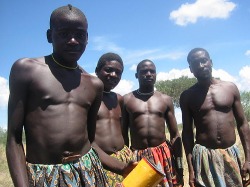The environment and whether
or not it is being used properly largely affect the Ovimbundu culture. Many of
the Ovimbundu people depend on the land to support them. However, forest and
woodland make up just fewer than fifty percent of Angola and these areas are
being destroyed over time. Deforestation is due to commercial logging, subsistence
agriculture, trade in charcoal, and forced migration. Land degradation is also
an issue that is being caused by unsustainable agriculture, mining, and
overgrazing of rangelands. Wildlife was also widely destroyed because of the
civil war in Angola and the massive amount of destruction that came along with
it.
 |
| http://hj2009per2angola.weebly.com/ indiginous-ethnic-groups.html |
Fishing
is also another large aspect of Ovimbundu survival and coastal degradation and
overfishing are threatening their culture. Overfishing by local and even foreign fleets is threatening
fish stocks and even going as far as causing extinction of some of the species
of fish. Many of the Ovimbundu live along the western coast of Angola and
fishing is how they make their living. Pollution from offshore oil production
is also becoming a threat to the marine environment of Angola and causing
issues for the Ovimbundu. If both the land and the marine environment continue
to be destroyed, the Ovimbundu will have a hard time surviving.
Another
factor that might become an issue for the Ovimbundu is the climate change.
Reports suggest that the temperature of Angola is rising at the rate of 0.33
degrees Celsius per decade and annual rainfall is decreasing at an average rate
of 2mm per month per decade. This may cause coastal lowlands to become vulnerable
to rising sea levels over time. Also rising sea temperature could potentially
threaten many fish species over time. All of these elements put together are
working against the survival of this culture.
No comments:
Post a Comment